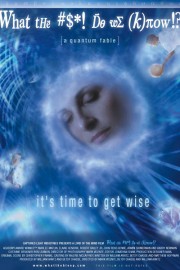What the Bleep Do We Know!?
This is a good time for me to be watching “What the Bleep Do We Know!?” for the first time. A small-scale phenomenon when it came out in 2004, it’s a film my mother credits with changing her life, or at least her perception on life. Me? In a way, it’s a by-product of post-“Matrix” cinematic world, where science-fiction and spirituality examine the real world through scientific theories. This isn’t like the Evolution vs. Intelligent Design debate, but a way of getting to the “truth” through science.
In the past couple of years since my hospitalization with pneumonia, I’ve been doing a lot of reading. Different books from different authors, taking unique directions to a basic truth- living in the moment is the only way to go. Some approaching that truth through psychology, some through spirituality, some through art, some by recounting life itself. The most recent one I’ve read is “The Power of Now” by Eckhart Tolle, which argues- convincingly, I might add- that the mind is our ego getting in the way of living in the moment. The mind is bound by time, which is obsessed with the past and future, making it difficult for us to simply live in the present.
In “What the Bleep Do We Know!?,” written and directed by Mark Vicente, William Arntz and Betsy Chasse, there’s a lot of talking heads, looking at the camera, telling us how Quantum Physics informs our lives, without us really knowing it even. A lot of it sounds like psycho-babble to me personally, career thinkers looking at answering life’s questions through their respective disciplines. Admittedly, some of it makes sense- like the discussion of a Buddhist who took pictures of water based on what our feelings did to the water molecules. Our moods, our emotions, what we’re feeling completely effect how our lives go. If we feel like it’s gonna be a good day, it’ll probably be a good day. If we wake up feeling lousy, get ready for a pretty bad day. The mind really does get in the way of enjoying life.
The connecting tissue of the film involves Amanda (Marlee Matlin), a photographer whose life opens up her mind to different ways of thinking, whether it’s through a young boy on a basketball court, a chance opportunity at a beautiful picture in the park, or revisiting the church where her wedding took place…not exactly a pleasant memory for her. Her psychological journey in the context of the film is the most interesting aspect of the film.
After a while, the talking heads begin to blur into one another, as do some of the ways the filmmakers go about visualizing what the interviewees are saying (especially when, at the wedding, visual effects take us down to the cells in the body, and look at how the cells change based on our emotions…it’s a bit silly personally). It’s at this point when the film really lost my interest, not because I didn’t get what it was saying, but because it really got ludicrous with all the CG emotion blobs.
There’s a lot to be said about the film on a philosophical level- the execution of these concepts makes it feel like New Age nonsense, especially when it comes to some of the more scientific explanations heard in the film. But as I’ve explored my own self on a personal and spiritual level, figuring out what’s important to me emotionally and philosophically, I can see some genuine value in this film on a conceptual level. The filmmakers aren’t looking to preach to us, but just open us up to possibilities we may not have considered before. In a way, this is a continuation of my recent string of “Movie a Week” entries, many of which have looked at protagonists trying to uncover the truths of their respective worlds.
In the end, though, the film doesn’t really resonate with me on a personal level. I kept thinking about Richard Linklater’s own philosophical experiment “Waking Life” while watching the film, a film that continues to resonate with me personally. That film was an ideal marriage of concept and execution- part documentary, part fictional narrative, using technology (ie animation) to enhance the narrative in an imaginative way that makes the concepts and ideas brought forth by the people the protagonist (Wiley Wiggins) meets in his dream journey. On the surface, Matlin’s character in this film is in the same vein as Wiggins. In “What the Bleep Do We Know!?,” Amanda is pretty clear about things by the end. In “Waking Life,” Wiggins is still searching for some of the answers.
Basically, how either film effects you in the end will depend on your viewpoint on life- do you feel more comfortable sensing you have a grasp on all the answers, or would you rather continue exploring, even if you don’t quite have the answers in the end? I guess that’s where my mother and I differ- I’m content exploring, realizing that the further I go down the rabbit hole, the more I can gain. Neither philosophy is wrong- it just depends on the person.










